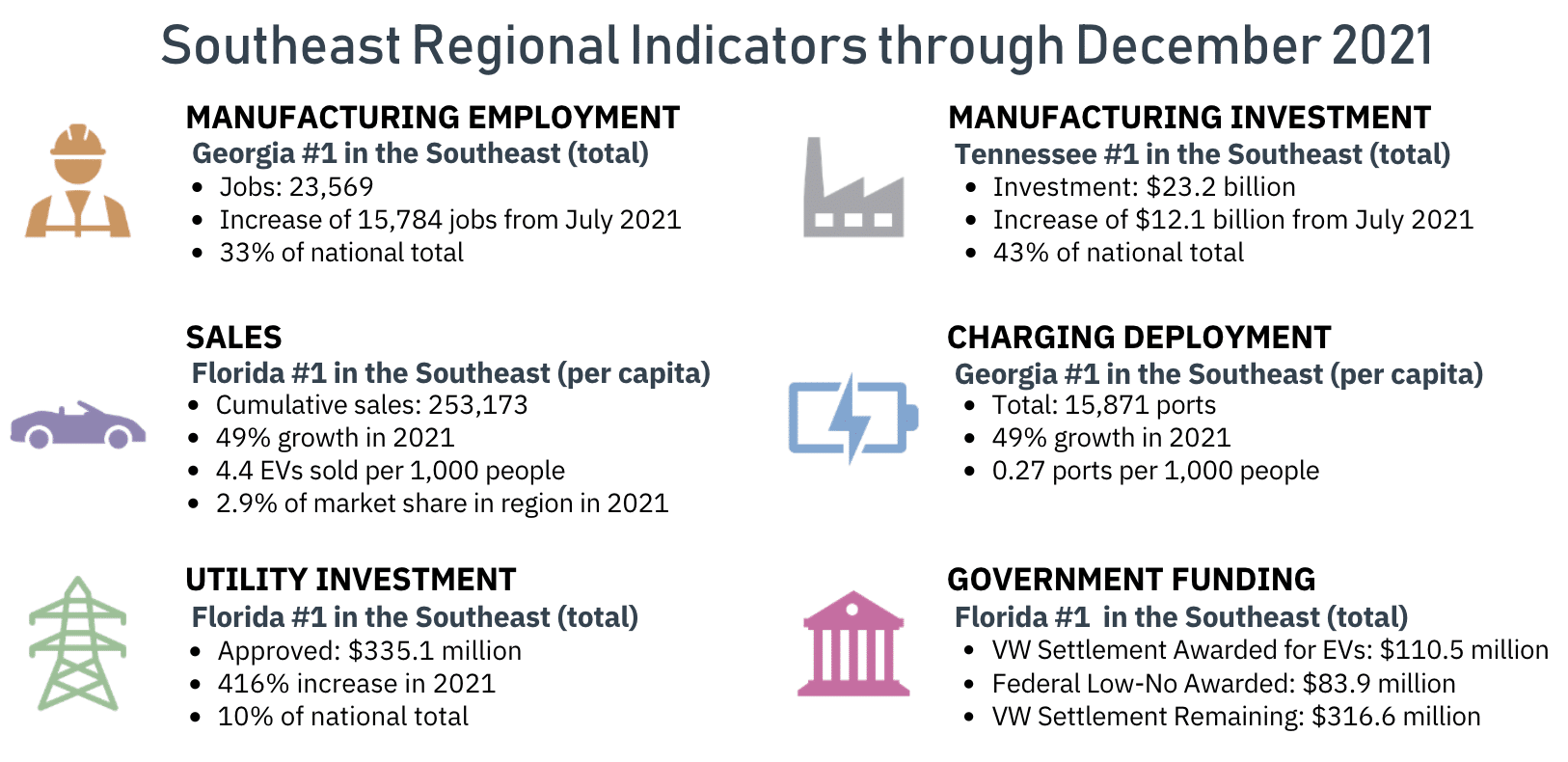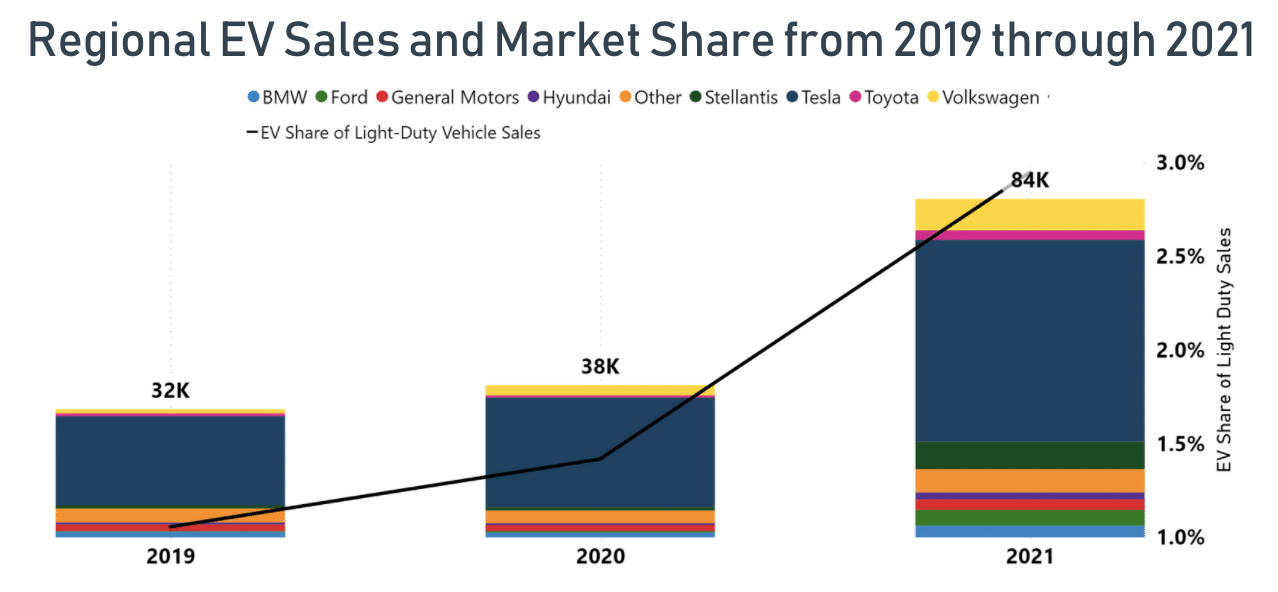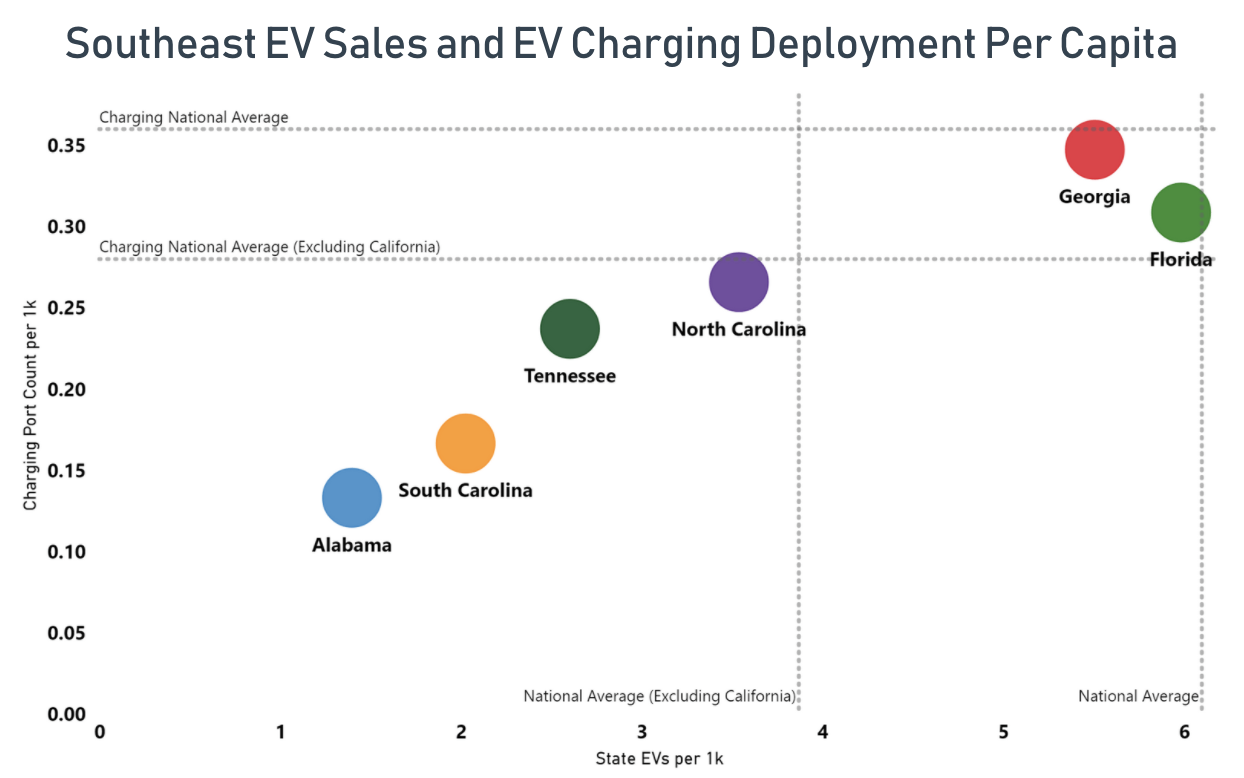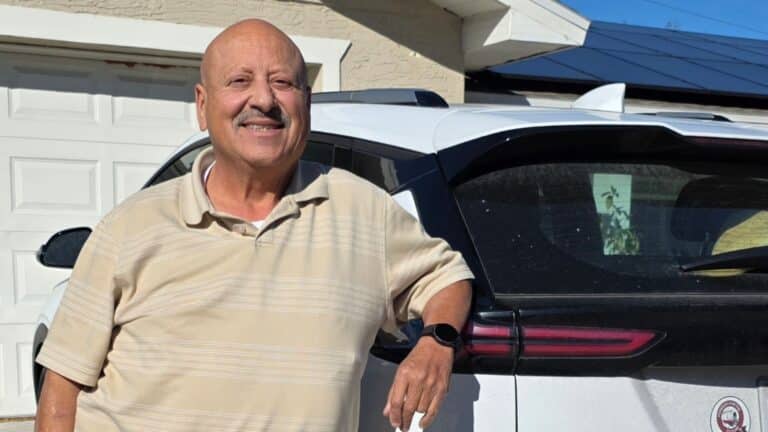The top-of-mind question for anyone watching the electric vehicle (EV) market is: when will the electrification of America’s cars, trucks, and buses take off? The answer? Imminently. Look no further than the Southeast, United States, where we are experiencing impressive EV market growth despite a lack of state-level EV-supportive policies, incentives, and regulations.
The Southern Alliance for Clean Energy (SACE) and our partner, Atlas Public Policy, updated key year-end indicator data from our annual “Transportation Electrification in the Southeast” report to capture regional and state-specific growth in Alabama, Florida, Georgia, North Carolina, South Carolina, and Tennessee. Some of the numbers are downright staggering.
[button color=”green” url=”https://cleanenergy.org/news-and-resources/transportation-electrification-in-the-southeast-state-pages/”]Download Southeast Regional and State 2021 Year-End Updates[/button]

Contextualizing the Moment
Global
This is a critical time for the expanding EV market. The pandemic has exposed global supply chain weaknesses related to auto manufacturing and battery production that can only be solved by increasing domestic production of critical materials and components. The Russian invasion of Ukraine is once again exposing the entanglement of America’s commitment to global democracy and dependency on oil for transportation, and highlighting the national security benefits of rapidly transitioning to electric mobility powered by domestic electricity.
Federal
The bipartisan Infrastructure Investment and Jobs Act (IIJA) will invest upwards of $7.5 billion in EV charging infrastructure to spur the build-out of a network of 500,000 EV chargers across the country. The $7.5 billion investment is larger than all the money invested nationally in EV charging deployment to date. Southeast states will receive at least $679 million of federal funding over the next five years to invest in public EV charging along highway corridors.
Industry
Automakers have committed to making desirable and affordable electric cars, trucks, and buses available to consumers and fleet operators. Collectively, automakers in the U.S. are investing nearly $55 billion in EV research and development and over $67 billion in EV manufacturing facilities. Many automakers have joined the growing list of countries and American states pledging to end fossil gas and diesel vehicle production by 2035.

Economic Development Remains in the Drivers Seat
The Southeast closed out 2021 far ahead of the rest of the country on electric car, truck, and bus manufacturing investment and jobs, with 18% of the nation’s population, but 43% of announced EV-related investment and 33% of announced jobs. In the past six months alone, the region added 15,784 manufacturing jobs and secured $12.1 billion in new investments highlighted by Rivian selecting Georgia, Toyota choosing North Carolina, and Ford expanding in Tennessee.
It is notable is that these jobs and investments are across the EV supply chain, including mineral mining, battery production, EV charging station fabrication, electronics assembly, software development, and vehicle manufacturing. Businesses are relocating and expanding in our region because of its pro-business political environment, large coastal and inland ports, lower-cost electric and water utility rates, and non-unionized labor.

Florida is leading the Southeast in EV sales per capita, while Georgia leads the per capita EV charger deployment race. Florida and Georgia represent the first time Southeast states are selling EVs and deploying chargers in line with national averages. North Carolina is beginning to make strides, reaching the national average for states (excluding California) for charger deployment and honing in on EV sales (the strength of the CA market skews national averages). While #1 in the region in EV-related manufacturing investment, Tennessee lags in sales and charger deployment, along with South Carolina and Alabama.
Investor-Owned Utilities Up Their Game in Q3 + Q4
The most eye-popping growth statistic is utility investment, up 416% in 2021. In 2020, Southeast utility EV-related investment represented less than 1% of utility EV-related investments nationwide. In 2021, the region jumped to 10% of national investments.
This growth was primarily driven by Florida Public Service Commission approving Duke Energy Florida’s and Florida Power & Light’s rate case settlements, which included over $260 million in EV program investments. Also, North Carolina regulators recently approved Duke Energy’s Make Ready Credit program, and the utility has filed a $56 million proposed EV Pilot program that awaits regulator approval.
Looking Ahead to 2022
The adoption of electric cars, school and transit buses is likely to surge along with charging station deployment, and we can expect continued manufacturing expansion across the region.
There are now 61 passenger light-duty EV models currently available and 31 more on the way including pickup trucks and more SUVs. New EVs provide drivers with a 302-mile range on average and are approaching sticker-price parity with fossil gas cars, likely resulting in the EV sales curve getting even steeper.
Electric school and transit buses are deploying in every state in the region, demonstrating better performance and lower operating costs than diesel buses. The added challenge for school districts and transit agencies of purchasing and installing EV chargers is starting to lift with support from federal, state, and utility funding, but it will remain a barrier.
State Departments of Transportation are organizing to receive federal IIJA funds to close charging gaps and enable EV drivers to confidently traverse the region’s highways. This build-out will begin in fall 2022 and continue through 2026. Along with providing more charging stations, installing the chargers will create ongoing work for electrical contractors.
As car, truck, and bus electrification and charging station deployment scales, states have work to do to ensure no communities are left behind and that all consumers have equal access to the public health, environmental, and economic benefits EVs deliver.
There is no reason to think that the EV-related economic development boom the region is experiencing will subside. But competition among Southeastern states is sure to heat up. Manufacturers and supply chain companies are going to invest where they can produce products cost-effectively and where consumers are eager and able to purchase. State policymakers and regulators would be wise to enable the most robust EV market possible because whichever states do will be in the strongest position to land the next big deal.
Stay tuned for the full report update coming later this year.
Download the 2021 Year-End Southeast Regional and State Updates and August 2021 Report
[button color=”green” url=”https://cleanenergy.org/wp-content/uploads/Transportation-Electrification-in-the-Southeast-Regional-Year-End-Update.pdf”]Southeast[/button]
[button color=”green” url=”https://cleanenergy.org/wp-content/uploads/Transportation-Electrification-in-the-Southeast-Alabama.pdf.pdf”]Alabama[/button] [button color=”green” url=”https://cleanenergy.org/wp-content/uploads/Transportation-Electrification-in-the-Southeast-Florida.pdf”]Florida[/button] [button color=”green” url=”https://cleanenergy.org/wp-content/uploads/Transportation-Electrification-in-the-Southeast-Georgia.pdf”]Georgia[/button]
[button color=”green” url=”https://cleanenergy.org/wp-content/uploads/Transportation-Electrification-in-the-Southeast-North-Carolina.pdf”]North Carolina[/button] [button color=”green” url=”https://cleanenergy.org/wp-content/uploads/Transportation-Electrification-in-the-Southeast-South-Carolina.pdf”]South Carolina[/button] [button color=”green” url=”https://cleanenergy.org/wp-content/uploads/Transportation-Electrification-in-the-Southeast-Tennessee.pdf”]Tennessee[/button]
[button color=”blue” url=”https://bit.ly/SEET2021Report”]August 2021 Report[/button]
Electrify the South is a Southern Alliance for Clean Energy program that leverages research, advocacy, and outreach to promote renewable energy and accelerate the equitable transition to electric transportation throughout the Southeast. Visit ElectrifytheSouth.org to learn more and connect with us.











